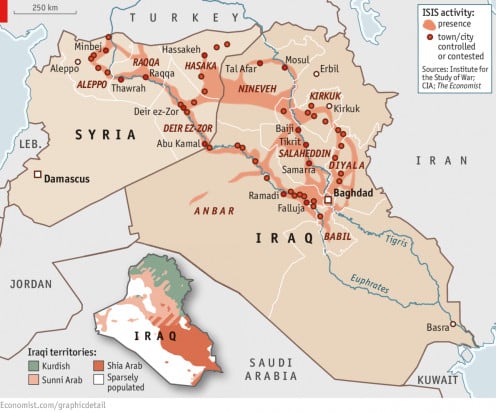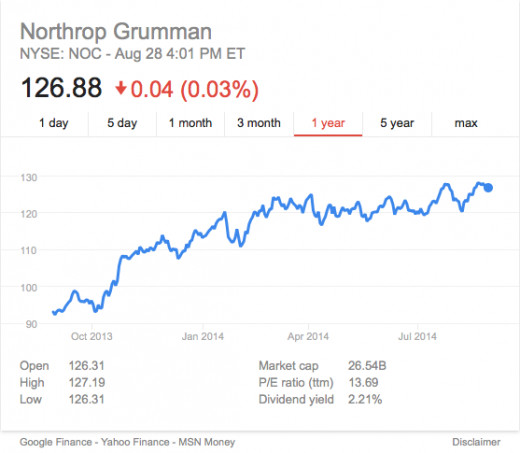Not So Fast: The Four Quick Questions You Must Ask About ISIS
Iraq is once again center stage in American politics; once again Americans are being warned that military action in Iraq is not only the 'right' thing to do in order to stop the barbarism there, but according to Senator Lindsey Graham, that it is necessary unless we want ISIS (The Islamic State of Iraq) here attacking us on our own soil. However, Americans aren't as willing to support more U.S. involvement in the region as they once were. Call it the 'Age of Information,' call it "war fatigue," or call it "cynicism," but Americans have received the $6 trillion tab for the first wars in Iraq and Afghanistan, and they aren't as willing to believe what they are told as they were in 2003.
Things were different back then; we had just suffered a major attack on our land, and the American people were "shock and awed" like never since Pearl Harbor. In the face of a sudden, devastating strike on our soil, most of us were willing to believe anything that our government told us. I was no different.
But things have changed. Social media pundits, seasoned journalists, and daring whistleblowers have challenged the status quo and exposed rather unsavory practices by our leaders on both sides of the aisle. The scandals surrounding the NSA, the IRS, and events in Benghazi have created too many questions, not enough answers, and not enough reasons to engender blind faith in the powers that be. And now, almost four years to the day after President Obama declared an end to the war in Iraq, we are told anew that the only way out, is back in. Really? Let's take a minute and suss things out, America.

1. Who is ISIS and Where Did It Come From?
Back in March of 2011, violent, nationwide protests rose up in Syria against President Bashar al-Assad's government. In 2013, Hezbollah entered the conflict in defense of al-Assad, as ISIS, the al Qaeda-linked, anti-Assad movement, gained strength in the east, eventually taking control of 1/3 of Syrian territory, as well as most of its oil and gas production by 2014. Russia militarily supported Assad, while Iran, Qatar, Saudi Arabia, Turkey - and yes, the United States - all transferred weapons and funding to the opposition. Sound familiar? Americans are asking themselves if the current crisis in Iraq is just another version of our past experience with the Taliban in Afghanistan when we armed them against the Soviets, only to have the Taliban turn around and fight us with our own weapons years later. Considering that the U.S. has agreed to arm the Kurdish peshmerga fighters against ISIS, the question now is how many times will the American government support arming dangerous militants in the Middle East until we realize that it's a reckless and counterproductive strategy?
Speak Out, America!
How should the U.S. deal with ISIS?
2. Who is Funding ISIS?
Much ado has been made about ISIS' sacking of the Mosul Central Bank in June, 2014, in which they made off with approximately the equivalent of $425 million; but considering that their war chest is currently estimated at $2 billion, clearly they are getting the bulk of their funding elsewhere.
Ironically, the oil fields that ISIS secured in Syria is providing the organization roughly $3 million dollars a day through sales on the black market, and yes, EVEN TO THE ASSAD REGIME. Take a minute digesting that one. The very same government that is raging bloody war against ISIS, is now funding it as well.
But of course, there's more. On June 16, 2014, Iraqi Premier Nouri al-Maliki announced, "we hold Saudi Arabia responsible" for the financial and moral support given to ISIS, an assessment supported by Günter Meyer, Director of the Center for Research into the Arabic World at the University of Mainz, when he stated that:
According to The Washington Institute for Near East Policy, there is "no credible evidence that the Saudi government is financially supporting ISIS," but admits that "questions continue to arise about Saudi financial support to the group." However, considering that Washington and the Saudi government have been "allies" since 1933, how credible is the Institute's determination?
There is no doubt that the U.S. and the Saudis both armed the rebels in Syria; this is a known fact. But furthermore, according to an August 8, 2014 report by the Council on Foreign Relations, supporters in Jordan, Syria, and Saudi Arabia provided "the bulk of past funding" to ISIS as well. If our allies in the Gulf are funding our enemies, it's a strong argument against allegiances in the Middle East across the board.
3. How Does ISIS Communicate to Mobilize?
Anyone who has ever served in the military can tell you how vital communications are to any martial offensive; how does ISIS communicate in order to rally its troops to action? Some secret, hi-tech innovation that allows them contact without oversight? Nope. They use Facebook, Twitter, Psiphon (a circumvention site for communication), WhatsApp, and Viber. Considering that Psiphon is a Canadian firm funded by the U.S. State Department, and that the rest of the social media outfits are American companies, it begs the question - WHY, exactly, hasn't the U.S. government compelled these firms to cut ISIS communication or be faced with war crimes? Yes, dropping bombs is 'sexier,' but it's also infinitely more expensive. ISIS wouldn't be able to mobilize without communication, and the fact that it can be easily disrupted, but isn't, should raise major flags to every American citizen. Which brings me to my last question...
4. Who Profits From American Involvement in Iraq?
I will trust that anyone reading this can connect the dots for themselves, so I'll keep it short.
In 2013, Northrop Grumman, one of the world's leading global defense technology companies, spent over $20 million lobbying Washington in 2013, an 18% increase over its reported $17.5 million lobbying efforts in 2012. Below is a graph depicting the annual stock trajectory for Northrop Grumman as of today, August 28, 2014.
And that's all I'm going to say about that.
Northrop Grumman

© 2014 nadia asencio








